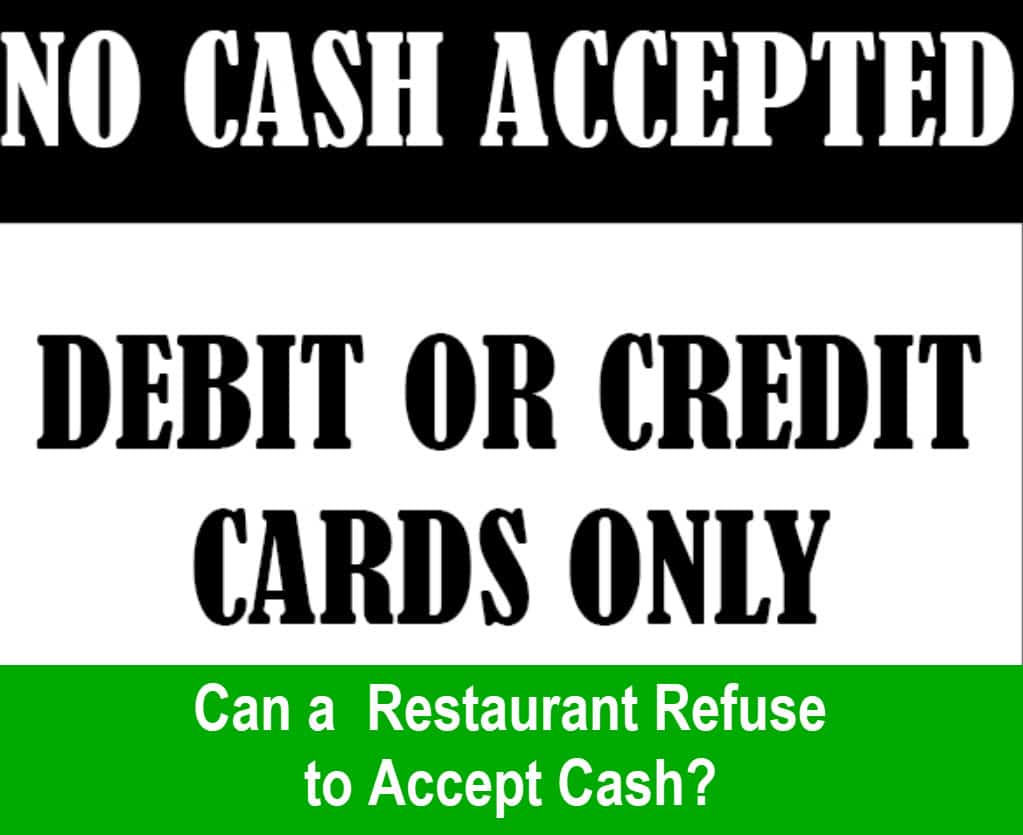Can a Restaurant Refuse to Accept Cash?

The above question, “Can a restaurant refuse to accept cash?” might make those who aren’t familiar with the restaurant industry scratch their heads and wonder what’s going on. Follow the advice at the bottom of this piece if you work in the food service industry or often dine out.
Nowadays, people tend to put cash on one side and use their cards to make purchases. In fact, according to one study, 80% of individuals prefer card payments to cash. But just because plastic has taken over does not mean that money is no longer necessary.
Many individuals prefer cash, and using cash is sometimes more convenient than using a credit card. Because of the rampant use of cards over money, it begs the question-can a restaurant refuse to accept cash? Is it permissible to take credit cards and other non-cash payments solely? Continue reading to learn more.
This method was initiated and spiked up during the Covid-19 outbreak. Although card and contactless payments have long been a part of our common financial culture, it wasn’t until the epidemic that cards replaced cash as the most popular payment option for companies worldwide.
Nonetheless, can a company or business deny cash payments ethically and legally, given that many older consumers are still reluctant to lay down their purses?
Can a restaurant refuse to accept cash? U.S. law does not require restaurants or businesses to accept cash, even if local regulations may compel it. Although some states have implemented legislation forcing companies to take cash, there is no federal rule that forbids them from turning cashless.
To hammer home the point, the Coinage Act of 1965 specifically states that “United States coins and money, includes Federal reserve notes and circulated notes of Federal reserve banks as well as national banks, are the legal currency for all obligations, public charges, taxes, and dues” (Section 31 U.S.C. 5103).
According to this legislation, any forms mentioned above of U.S. currency can be presented to a creditor as a genuine and legitimate offer to settle a debt. However, no federal law requires a private company, individual, or organization to take money or coins in exchange for products and services.
Unless state legislation prohibits it, private enterprises can establish cash acceptance procedures. For instance, a bus company may forbid paying fares in cents or dollars. As a policy, movie theaters, convenience shops, and petrol stations may not accept significant denomination currencies (often notes exceeding $20).
Can a restaurant legally refuse customers who only have cash?
The Federal Reserve System claims that no federal law requires a private company, individual, or organization to take money or coins in exchange for products or services.
According to the Federal Reserve System, companies can decide whether to take cash on their terms unless there is conflicting state legislation.
In other words, no federal legislation requires private companies to accept client cash payments.
Thus, let’s sum up:
- Federal law does not mandate monetary payments to private businesses.
- You are free to receive payments in any format you like.
Is it legal not to accept cash according to state laws?
Your state or municipality could mandate that your firm accept cash payments. State laws regarding cash acceptance policies supersede federal restrictions. You must abide by the law if your state’s legislation requires that you take cash payments. You can incur fines and penalties for breaking your state’s or your locality’s restrictions on accepting cash.
Some states may have limits on what a company may do. For instance, several jurisdictions mandate that private impound facilities take payment from customers who want to collect their automobiles.
Before denying cash at your small company, be sure your state or local laws allow it.
Can a restaurant refuse to accept cash in Florida?
According to the U.S. Department of Treasury, no federal legislation “requires a private company, a person, or an organization to accept cash or coins as payment for products and services” according to the U.S. Department of Treasury.
The ability to pay for products and services using a variety of currencies, including paper money, plastic cards, and digital wallets, is a fundamental aspect of a developed society.
Additionally, as technology advances, digital payment methods like Apple Pay, Google Pay, and PayPal on websites have grown in popularity.
Though politicians in Florida and several other states seek to stop it from happening, worries have been expressed about a sustained march to a cashless society.
Representatives from both chambers of the Florida legislature have introduced a bill to protect customers who pay with cash at retail establishments; it will be addressed during the next 2022 session.
Pros and cons of refusing cash
The transition to contactless payments may be smooth for many digital natives. Still, eliminating cash registers and adopting digital currencies may be pretty challenging for those who are more vulnerable.
In other words, a cashless society could be on the way. Is this a benefit or a drawback? Let’s examine both sides of the argument.
Pros
Not all companies are transitioning to cashless systems, including chains. Even tiny firms have a lot to gain in several essential respects.
- You get to reduce costs and time. Businesses must pay a charge for each credit card transaction and pay an employee overtime compensation for accepting cash. These extra hours pile up, from calculating the money at the end of the day to making many journeys to the bank and sometimes paying deposit fees. When the salad company Sweetgreen initially decided to go cashless, they issued a statement noting that a significant factor in the choice was the need to expand and the fact that they had to spend roughly two hours each day managing currency in each location.
- It improves the speed of checkout. A credit card transaction may be significantly quicker than a cash purchase when using only one swipe or tap. Going cash-free may substantially speed up the checkout process and cut down on lines for companies that frequently have large lines during peak hours, encouraging more consumers to stop by and purchase.
- You get to minimize risk. You put your company in danger of theft and robbery by keeping cash in the register. After experiencing five armed robberies in the space of four months in Baltimore, one café went cashless in 2017. Statistic Brain and CNBC also claim that employee stealing costs U.S. corporations $50 billion annually. You’re also preventing staff from stealing money from the register by refusing to accept cash.
- It enhances your accounting. Just think about how much time it would save you if you never had to go through the records again to determine why the register was running low at the end of the day. Going cashless makes it simple to keep track of every transaction, which improves accounting and boosts efficiency and profits.
- A cashless society should also result in a decline in financial crime. Cash is frequently used in unlawful activities like illegal gambling or drug operations since there is no transaction record, and it is simpler to launder the money this way. The source of funds must always be known, which makes money laundering considerably more difficult. A record of every payment you get makes it more challenging to conceal income and avoid paying taxes.
Cons
As demonstrated by Shake Shack’s decision to reverse its decision to become cashless, there are some clear disadvantages to choosing not to accept cash at your firm.
Due to the criticism surrounding cashless businesses, Sweetgreen, a pioneer of the practice, has decided to start getting cash once more. These are a few reasons your company might not want to stop accepting money.
- It ends up with additional credit card fees. Business owners spend substantially on monthly credit card transactions since credit card fees may be as high as 3% or 4% on each purchase. Due to this tax, many independent companies still only accept cash or charge a fee to consumers who use credit cards. Other firms are compelled to include credit card fees in their rates, which may result in some consumers moving to the competition.
- You risk losing clients. The well-known New York burger company Shake Shack attempted to go cashless but abandoned the idea in 2018 due to several angry customer complaints. If you go cashless, many young people, senior citizens, and other traditionally unbanked or underbanked individuals would be forbidden from making any purchases at your company. Other consumers can be turned off by your choice to stop accepting cash, which might lead to bad press or possibly a boycott of your company. Customers will also be compelled to go elsewhere if they choose to pay with cash, possibly for privacy or data security concerns, or if they don’t have their cards on them. As personal financial expert Dave Ramsey suggests in his envelope approach for budgeting, some clients only use cash for budgeting purposes. Do you want to imply that all those folks cannot purchase with you?
- In the event of a system failure, accepting payments is impossible. It’s stressful enough to have your credit card system down in the middle of the day, even with the backup option of accepting cash until it’s back up. Nonetheless, you will not be permitted to accept any payment if your firm decides to accept cash no longer.
- Cashless transactions pose a risk for cyberattacks. The bank robbers and muggers of the digital realm are hackers. You are more susceptible to hackers in a cashless culture. You might not have any other means to spend money if you are a target and someone empties your account. Even if you are covered by federal law, getting your financial situation back on track following a breach will be difficult.
- Digital transactions give up privacy; digital transactions are less private than cash transactions. It’s possible that you have nothing to conceal and that you trust the companies handling your data. But the more information you have online, the more probable it is to fall into the wrong hands. You may send and receive money anonymously using 6 Cash.
Are you refusing cash? Follow these three tips.
Are you considering having your firm altogether reject cash? Then consider these three suggestions.
Post your policy
If you don’t want to take cash at your business, display your policy and make sure your clients can see it.
Post your policy somewhere customers would notice it before making a purchase, such as your front door, website, and points of sale. Include the several payment methods you accept in your policy (e.g., checks, credit cards, etc.)—the justification for your policy (such as “Due to COVID-19…”) may also be included.
Offer a variety of payment options.
Provide clients with a range of payment choices if you don’t take cash to make it simple for them to pay you in another way. Think about approving:
- Debit cards
- Credit cards
- Checks
- Paying using a mobile wallet
- Gift cards
Ensure your payment system is user-friendly as well. Verify that the hardware used for processing payments is current and in good functioning order.
Look into costs
For small businesses, accepting additional payment methods like credit cards might be expensive. Processing charges for credit cards may be pricey. A percentage of each sale made with a credit card is often the payment you make to a retailer. Equipment and setup fees may also be required.
Please do your homework and research the expenses and fees related to various payment options before introducing them.
Accepting cash? Keep these things in mind…
Do you intend to let your clients pay you in cash? Great! Remember these three things at all times.
Record all cash transactions
Every transaction, including cash sales, must be documented if you operate a business. If you take paper money from consumers, you should handle cash transactions like any other.
Make a general ledger record in your books for each monetary transaction. Keep a description of the sale’s purpose, the transaction’s date, and the price. To back up your data in case there are any inconsistencies, save supporting papers such as receipts. Regularly record your cash transactions to keep your accounts up to date and spot errors early.
Make cash deposits
It might be risky to leave excessive cash in your register(s). Make deposits instead of letting money accumulate in your records. Open a business bank account that will only be used for business dealings to deposit funds. Put the money your company has made from sales in a bank account after the specified time frame (day, week, etc.).
Your cash is more securely stored with a corporate bank account. Additionally, it provides you with an additional record of sales. You should have a safe place to keep your money while you wait to make the regular deposits you need to make. Consider purchasing a safe to save extra cash from the register until you can deposit money. Moreover, restrict access to the safe to a select few staff (e.g., managers).
Avoid accepting large bills.
Avoid taking large amounts (such as $50 or $100) to safeguard your company from counterfeit currency. The most often counterfeited notes are those that are large. Consider establishing a policy on the types of banknotes your firm will take to avoid accidentally taking counterfeit currency. For instance, you might only accept $1, $5, $10, and $20 notes.
You can verify banknotes using a specialized counterfeit money detection pen in addition to adopting a policy. These affordable pens allow you to determine whether a banknote is phony. Find out how to spot counterfeit currency.
Next, you may teach your employees how to spot suspicious-looking bills and what to do if they get one (for example, search for watermarks). Giving consumers their change back when you accept large payments can also be problematic. If you take extensive checks, be ready to give consumers the right kind of change.
CONCLUSION
Although a world without currency may seem like something from science fiction, it is now a reality. Many financial institutions, service providers, and governments support the move because it already occurs in many modern financial processes and transactions. But then, will the growth of contactless payments render currency unnecessary?
No. Cash’s distinctive qualities guarantee its continued usefulness in the future. Although many find digital payment methods to be convenient, not everyone finds them to be appropriate. In addition to cash, merchants will accept contactless payments.
And lastly, will we ever stop using cash? Well, I don’t think so. Shortly, cash will continue to be the standard form of payment. Cash may be used to make payments without the involvement of a third party, is valuable, and can be validated and recognized from counterfeits with reasonable accuracy. Cash is the only payment option that efficiently combines all three components.
Jeff Smith is a Restaurant Consultant with over 20 years of hospitality experience ranging from server to owner and general manager. He focuses on Restaurant POS technology as well as restaurant marketing. Make sure to check out our world famous restaurant resources page for a comprehensive offering of hand picked resources and tools to help your business. You can also check out some of our other restaurant business articles.



